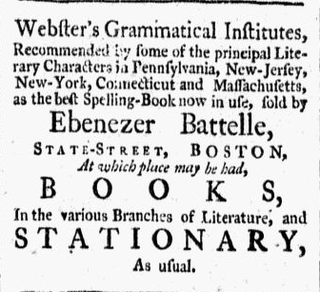Related Research Articles

Norfolk County is located in the U.S. state of Massachusetts. At the 2020 census, the population was 725,981. Its county seat is Dedham. It is the fourth most populous county in the United States whose county seat is neither a city nor a borough, and it is the second most populous county that has a county seat at a town. The county was named after the English county of the same name. Two towns, Cohasset and Brookline, are exclaves. Norfolk County is included in the Boston-Cambridge-Newton, MA-NH Metropolitan Statistical Area. Norfolk County is the 24th highest-income county in the United States with a median household income of $107,361. It is the wealthiest county in Massachusetts.

Ebenezer Battelle (1754–1815) was an American Revolutionary War veteran, a bookseller in Boston, Massachusetts, and a settler of Marietta, Ohio, in the late 18th century.
Henry Phillips was a wealthy businessman and politician from Boston and Dedham, Massachusetts. Phillips was described as "tender and brokenhearted."

Samuel Dexter (1726—1810) was an early American politician from Dedham, Massachusetts.
Daniel Fisher represented Dedham, Massachusetts in the Great and General Court. He served from 1700 to 1704 and then again in 1712 and 1713. He also served nine terms as selectman beginning in 1690.
Dr. Joseph Richards represented Dedham, Massachusetts in the Great and General Court. Beginning in 1731, he served five terms as selectman.
Isaac Bullard represented Dedham, Massachusetts in the Great and General Court. He was also town clerk for a total of three years, having first been elected in 1784. He was also elected five times as selectman, beginning in 1773. Bullard was the first treasurer of Norfolk County, serving from 1793 to 1808.
Ebenezer Fisher represented Dedham, Massachusetts in the Great and General Court. The Fisher School, now in Westwood, Massachusetts, was named in his honor. He served as selectman in 1785. He voted against the Norfolk and Bristol Turnpike as a member of the legislature in 1802. Fisher Ames was a driver for the road, and his brother Nathaniel believed his no vote made him a "traitor" motivated by "an ancient prejudice against the Old Parish," i.e. modern day Dedham.
Richard Ellis represented Dedham, Massachusetts in the Great and General Court.
William Adams was minister of the First Church and Parish in Dedham.
Jason Haven was the longest serving minister of the First Church and Parish in Dedham.
John Hunting was Ruling Elder of the First Church and Parish in Dedham.
The Samuel Dexter House is a historic house at 699 High Street, Dedham, Massachusetts. It was built, beginning in July 1761, by Samuel Dexter, a member of the Massachusetts Provincial Congress.
Samuel Morse (1585-1654) was an original proprietor of Dedham, Massachusetts who served on the board of selectmen for two years. He was also a founder of Medfield, Massachusetts when it broke away from Dedham. He was elected a selectman before joining the First Church and Parish in Dedham. He was a signer of the Dedham Covenant.
Nathaniel Colburn (1611–1691) was an early settler and selectman in Dedham, Massachusetts.
Lt. Daniel Pond was a prominent early settler of Dedham, Massachusetts.
Captain Aaron Fuller was an early American military official from Dedham, Massachusetts.
William Montague was an Anglican cleric at Old North Church in Boston and St. Paul's in Dedham, Massachusetts.
The Norfolk County Jail was a wooden jail located on Highland Street in Dedham, Massachusetts. Following the creation of Norfolk County in 1792, Timothy Gay deeded land to the county for the creation of the jail in October 1794. Construction began that year but it was not complete until 1795. The donated land, next to Gay's tavern on Highland Street, was on the corner of Court Street next to the present day St. Paul's Church.

St. Paul's Church is an Episcopal Church in Dedham, Massachusetts
References
- 1 2 3 4 5 6 7 Schutz, John A. (1997). Legislators of the Massachusetts General Court, 1691-1780: A Biographical Dictionary. UPNE. p. 314. ISBN 978-1-55553-304-5 . Retrieved 8 November 2019.
- 1 2 3 4 5 Hanson 1976, p. 151.
- ↑ "Bernard Quartich New Acquisitions June 2018" (PDF). Bernard Quartich Ltd. June 2018. Retrieved November 22, 2019.
- ↑ "Dedham Village in 1795". Dedham Historical Register. XIV (2). Dedham Historical Society: 39. April 1903. Retrieved 22 November 2019.
- 1 2 3 Registers of Deeds The Early Years, Norfolk County Registry of Deeds: Norfolk County Registry of Deeds, 225th Anniversary Notable Land Records Project
- ↑ Louis Atwood Cook (1918). History of Norfolk County, Massachusetts, 1622-1918. S.J. Clarke publishing Company. p. 478.
- 1 2 "Dedham Historical Society & Museum trivia answers". The Dedham Times. Vol. 30, no. 1. January 7, 2022. p. 18.
- ↑ Worthington 1827, pp. 106–107.
- ↑ Worthington 1827, pp. 79.
- ↑ Worthington 1827, pp. 79–81.
- ↑ Hanson 1976, p. 125.
- ↑ Hurd, Duane Hamilton (1884). History of Norfolk County, Massachusetts: With Biographical Sketches of Many of Its Pioneers and Prominent Men. J. W. Lewis & Company. p. 90. Retrieved 1 October 2019.
- ↑ Brems, Lisa (April 12, 1998). "For 'baby cemetery,' a taxing reemergence". The Boston Globe. p. 17. Retrieved October 1, 2019.